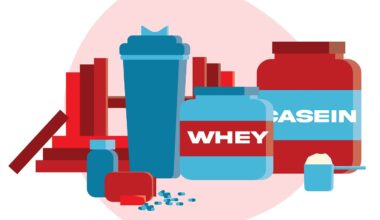How Nutrition Influences Your Mindfulness During Workouts
Nutrition plays a vital role in fitness, particularly in how it affects your mindfulness during workouts. By focusing on what you consume, you can enhance your mental clarity and emotional well-being during physical exercise. Mindful eating involves being aware of your nutritional choices, which can positively influence your workout. Consuming balanced meals that contain the right mix of carbohydrates, proteins, and healthy fats fuels your body. For instance, complex carbohydrates provide long-lasting energy, while proteins support muscle recovery. Implement portions of fruits and vegetables for essential vitamins. Listening to your body’s hunger signals is essential; this helps you avoid overeating or feeling sluggish during workouts. Planning your meals can enhance your performance. Additionally, staying hydrated is crucial for maintaining focus. Water facilitates bodily functions and prevents fatigue. You can use herbs and spices to make meals more enjoyable, thus encouraging mindfulness. Establishing a regular eating schedule can reduce stress and ensure you’re consistently energized. The connection between nutrition and mindfulness is significant, influencing not just physical but mental performance. Overall, mindful eating habits enhance your overall workout experience and results.
Understanding your body’s needs is crucial for improving mindfulness when exercising. This implies recognizing how different foods influence your energy levels, mood, and focus. By incorporating nutrient-dense foods into your diet before workouts, you can elevate your performance. For example, foods rich in omega-3 fatty acids, such as salmon and walnuts, can boost brain function and mood. This mental clarity is essential for staying present during workouts. Likewise, foods high in magnesium, such as spinach and bananas, can help reduce anxiety and promote relaxation. Pay attention to how these foods make you feel both before and after workouts. Additionally, maintaining a food diary can be an effective way to track your eating habits and their link to your workout performance. With consistent practice, you can find out which foods help you feel more mindful and focused. Don’t forget to celebrate small victories; acknowledging your progress reinforces positive changes in your nutrition habits. This ongoing process connects nutrition with mindfulness, creating a healthy cycle of improvement. Ultimately, this helps to foster a deeper connection between your mind and body, enhancing your workout efficiency and enjoyment.
Mindful Eating Practices for Fitness
Mindful eating practices can greatly enhance your fitness journey by promoting awareness and intentionality during meals. One effective method is to practice gratitude before eating, allowing you to appreciate the food’s origin and nutritional value. This encourages a conscious decision-making process about what you eat. Chewing food slowly and savoring every bite can improve digestion and satisfaction. Also, minimizing distractions during meals, such as cell phones or television, allows greater focus on the act of eating, leading to improved awareness of hunger and fullness cues. Portion control is another critical aspect; serving smaller meals can help prevent overeating and improve satisfaction. Experimenting with different flavors, textures, and colors in your meals can increase enjoyment, making you more focused. Preparing meals can be an opportunity to practice mindfulness, transforming food prep into a meditative experience. Moreover, engaging in community meals with friends or family can create a fuller, more enriching eating experience. Remember, the goal is to cultivate a relationship with food that aligns with wellness. Mindful eating practices will not only support your nutritional needs but will also enhance your mindfulness during workouts.
Choosing the right pre-workout snacks is essential to fuel mindful workouts effectively. A balanced snack featuring simple carbohydrates and a touch of protein can offer a beneficial energy boost without causing sluggishness. Whole grain toast with almond butter is an excellent option, providing sustained energy. Alternatively, a banana with a scoop of nut butter combines carbohydrates and healthy fat, offering quick energy. Experiment with different combinations to determine what works best for your body. Also, timing your snacks is crucial; consuming them about 30-60 minutes before working out is ideal. This time frame allows your body to metabolize and utilize the nutrients effectively. Moreover, consider the effect of caffeine on your mindfulness. Consuming a small amount of caffeine from a cup of green tea or black coffee can enhance focus and performance. Staying hydrated is equally essential; remember to drink water before, during, and after workouts, which boosts energy levels and supports mental clarity. Keep track of how different snacks impact your workouts by maintaining a food diary. Assessing this can foster mindful eating practices, helping you perform at your best while remaining aware of your body’s needs.
The Role of Hydration in Mindfulness
Hydration is a critical component of nutrition that facilitates mindfulness during workouts. Our bodies consist mostly of water, making hydration essential for optimal performance. Dehydration can lead to fatigue, reduced concentration, and impaired physical performance, which detracts from workout mindfulness. It is recommended to drink water before, during, and after exercising. Aim for at least half your body weight in ounces of water daily, adjusting based on physical activity intensity. Herbal teas and infused waters can make hydration enjoyable and flavorful. Incorporate tracking hydration through apps or journals to encourage consistent intake. Being mindful of hydration also includes recognizing thirst signals, ensuring you satisfy your body’s needs. In terms of nutrition, consider including fruits and vegetables with high water content, such as cucumbers and watermelon, in your diet. This not only hydrates you but also provides essential nutrients. You can create a hydration schedule, reminding yourself to drink water regularly. The combination of proper hydration and mindful eating habits enhances workout focus and clarity, promoting an effective fitness journey. Ultimately, establishing good hydration practices contributes significantly to your overall mindfulness and wellness during physical activities.
While exercise is vital to fitness, nutrition significantly influences how effectively you can perform. It’s essential to strike a balance between both aspects. Specific nutrients play a crucial role in energy levels, mood, and overall workout performance. Carbohydrates are the primary source of energy; thus, prioritize whole grains, fruits, and vegetables in your diet. Proteins support muscle repair and recovery, so don’t neglect them; sources can include lean meats, legumes, and dairy. Fats are crucial too; they help in maintaining hormonal balance. Furthermore, an understanding of macronutrients enables you to tailor your diet according to your fitness goals. For a focused workout, establish pre- and post-workout meals that align with your energy requirements. Staying consistent with nutritional choices takes time, patience, and reflection. Regularly assess how particular foods impact your mood and mindfulness. Collaborating with nutritionists or personal trainers can enhance your knowledge and adherence to a mindful diet. Emphasizing self-care is critical; your overall mental health and fitness depend on intentional food choices. Ultimately, aligning your nutrition with fitness goals will cultivate a rewarding connection between your body and mind.
Conclusion: Integrating Mindfulness in Nutrition
Integrating mindfulness into your nutrition plan enhances your overall fitness experience. Recognizing the powerful connection between what you eat and how you feel during workouts empowers you. It starts with an awareness of food choices, paying attention to portion sizes, and recognizing how various foods affect your performance. You can transform your approach to nutrition by focusing on whole, nutrient-dense foods. When you eat mindfully, you cultivate a sense of gratitude for your meals, reinforcing a positive mindset. Scheduled meal times and prepping can transform eating into a mindful practice, boosting your fitness regimen. Educating yourself on nutrients helps target your personal fitness goals effectively. Pairing mindful eating with hydration practices can elevate your overall well-being and support emotional balance during workouts. Continue exploring diverse recipes that align with your nutritional needs, creating excitement around mindful eating. Finally, engage in reflective practices, such as journaling or meditating, to maintain focus on your journey. Your fitness goals should include both physical and mental wellness. By consciously choosing and appreciating nutritious foods, you’ll achieve a more fulfilling workout experience and overall life satisfaction. Embrace the journey towards mindful nutrition and enhance your fitness.
Integrating mindfulness into your nutrition plan enhances your overall fitness experience. Recognizing the powerful connection between what you eat and how you feel during workouts empowers you. It starts with an awareness of food choices, paying attention to portion sizes, and recognizing how various foods affect your performance. You can transform your approach to nutrition by focusing on whole, nutrient-dense foods. When you eat mindfully, you cultivate a sense of gratitude for your meals, reinforcing a positive mindset. Scheduled meal times and prepping can transform eating into a mindful practice, boosting your fitness regimen. Educating yourself on nutrients helps target your personal fitness goals effectively. Pairing mindful eating with hydration practices can elevate your overall well-being and support emotional balance during workouts. Continue exploring diverse recipes that align with your nutritional needs, creating excitement around mindful eating. Finally, engage in reflective practices, such as journaling or meditating, to maintain focus on your journey. Your fitness goals should include both physical and mental wellness. By consciously choosing and appreciating nutritious foods, you’ll achieve a more fulfilling workout experience and overall life satisfaction. Embrace the journey towards mindful nutrition and enhance your fitness.


